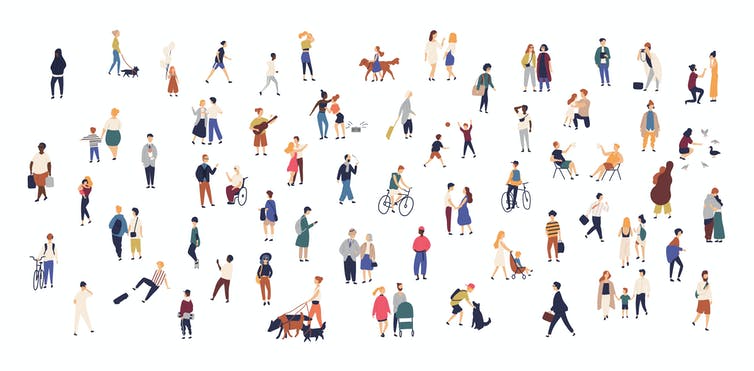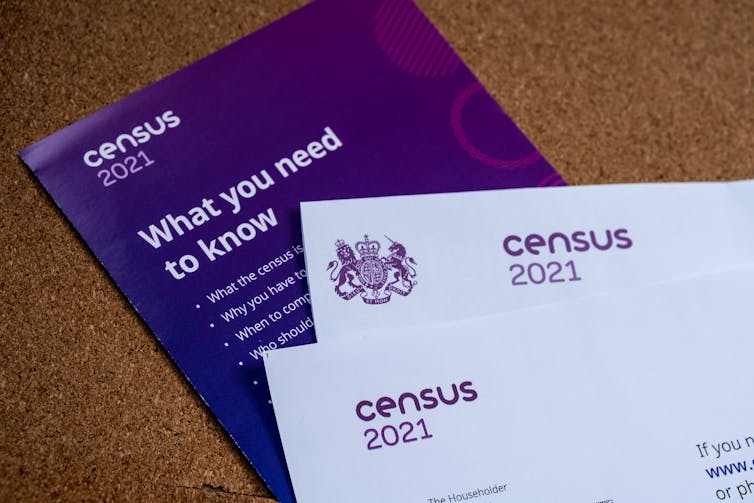Census 2021: why it’s important to take part and what happens to your information

Letters are dropping through doors asking people in Wales, England and Northern Ireland to fill out the 2021 census ahead of census day on March 21.
(Scotland has delayed its census until 2022 because of the pandemic).
At it simplest, the census is a count of the population, recording how the numbers of people and their attributes vary from one neighbourhood to another across the UK.
But how much of your information is visible to the people using the information to make decisions? Here are some key questions answered.
What sort of information does the census ask for?
It is primarily a mix of demographic information. For example: how old people are, their gender and family relationships; socio-economic information, such as the size of the property, main job and educational qualifications; ethno-cultural background; health; and some voluntary questions, including religious identity and sexuality.
What is the information I give to the census used for?
It is used to understand how the characteristics of the UK population vary across England, Wales, Scotland and Northern Ireland. This is important to predict the demands on and to inform the financing of public services, such as schools and healthcare, to support decision-making in business and commerce, and to map the social geography of the UK. There are some good examples of how census data are used on the Scottish census website.
Why is it important to fill out the census?
It is a legal requirement to fill out the census. You can be fined up to £1,000 for not doing so. The reason for this “stick” is that the data need to be as reliable as possible and that requires as many people as possible to take part.

Shutterstock
If particular social groups are under-counted then that will lead to an inaccurate picture of the UK’s population. This could have an adverse, knock-on consequence on targeting support for local services where it is most needed. For example, imagine a particular group of people are concentrated in one part of the country where they are reluctant to provide information to the census. Imagine those people have school-aged children. The risk is that their schools will not receive the funding they would have had if the number of children who live locally had been accurately counted.
Who runs the census?
The Office for National Statistics in England and Wales, National Records of Scotland and the Northern Ireland Statistics Agency. These are national organisations that collect and publish statistics about the economy, population and society of the UK. As non-ministerial departments/agencies they operate with independence from governments. This is to protect them from political interference. They are, however, accountable to the UK’s various parliaments, which provide scrutiny and oversight.
Who has access to my data and how much do they know about me?
Only carefully selected and approved staff at the ONS or its sister agencies in Scotland and Northern Ireland can see your personal census information when you submit it. It cannot be used by the government in this raw form. The government only gets access once the data are published after being anonymised. At this point, you cannot be identified.
Census tables typically merge your data with that provided by others who live in the same neighbourhood or region as you. That means those tables do not reveal information about individuals but about the populations of geographical areas. Your census record is kept secure for 100 years and only then can it be seen by future generations.
Can my data be sold or passed on to third parties or other countries?
Your personal information cannot be sold to third parties. When the census tables are published they are made freely available to a number of sources. You can access recent census data here and here, for example. But, remember, these do not disclose personal information. You can’t be identified via that data. Note how these maps of census data are shaded by neighbourhoods, not by individuals.
How do I know the information I give to the census won’t be used to discriminate against me or deny me a public service in the future?
The confidentiality of your data is legally protected. Laws in place that cover protection of your data include the Data Protection Act 2018, General Data Protection Regulation (GDPR), the Census Act 1920, and the Statistics and Registration Service Act 2007. You can find out more from the census website.
Will the information I give to the census affect my immigration status?
No. Your personal information cannot be seen or used by anyone making decisions about your residency applications or immigration status.
If I’m living in an informal situation that I haven’t disclosed to the authorities. Can my census information be used against me?
No
How does census data get stored?
We asked the ONS about this. They said, “The safety of your information is our top priority,” and added:
The ONS has robust security implemented across our services and systems to protect census data that are consistent with government policy and good industry practice. Answers on the online questionnaire are protected during entry and passed into ONS systems through a secure transfer mechanism. Your information is stored in ONS managed systems in highly protected areas with limited access and sophisticated monitoring to detect suspicious activity.
Linking and matching of the data is performed within a specific and highly protected area, by staff who have been security vetted and their activity overseen by management and monitored. We are constantly reviewing and renewing our security protections to safeguard census in our systems.
Richard Harris, Professor of Quantitative Social Geography, University of Bristol
This article is republished from The Conversation under a Creative Commons license. Read the original article.
Spotted something? Got a story? Email: [email protected]
Latest News
